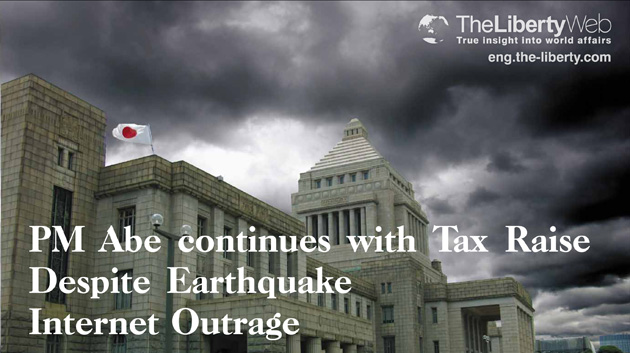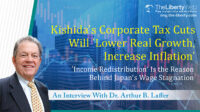PM Abe continues with Tax Raise Despite Earthquake
Internet Outrage
Prime Minister of Japan Shinzo Abe announced at the TPP special committee that he still plans to raise the consumption tax in April 2017. He repeated his previous argument saying, “Unless a radical incident on a Lehman shock scale, or a huge natural disaster occurs, we plan to continue with the raise”. He did not consider whether or not the Kumamoto earthquake counts as a huge natural disaster.
Internet forums reacted in an outrage with comments such as “Isn’t the Kumamoto earthquake a natural disaster?”, “Mr. Abe you make no sense” and “This is so cold-blooded”. The Kumamoto earthquake was the same 7 on the JMA Shindo scale as the Great East Japan and the Great Hanshin earthquakes. Despite the considerably smaller damage in comparison to the two great earthquakes of the past, it is impossible to ignore the damage it will have on the economy.
Raising Tax in the Current Economic Conditions is Difficult
Putting the earthquake aside, let us consider the other condition that the Abe administration advanced to postpone the tax raise: a Lehman shock scale disaster. In fact, the current economic indicators show that a recession inevitably awaits Japan so, according to Prime Minister Abe’s statement, the tax raise should be postponed.
Kyoto University Professor Satoshi Fujii has compared the influences that the Great East Japan earthquake restorations had on Japan’s GDP with the influence that the tax raise to 8% has had. He found that from 2010-2012, around the time of the earthquake, the GDP went up by 6.6 trillion yen. On the other hand from 2013-2015 when Abe introduced the raise, the GDP only went up by 2.1 trillion yen. In conclusion, the tax raise has had more of a negative impact on GDP than the earthquake.
The Sankei newspaper studied individual consumption which is approximately 60% of the total GDP. They found that it was the tax raise to 8% that caused the greatest damage to individual consumption, not the earthquake, or even the Lehman shock. Data reveals that the consequences of the raise to 8% has lasted longer than when they raised the tax to 5% back in 1997.
Negative Growth predicted for 2017
The effects of natural disasters on the economy lasts only a short time, but the influences from raising taxes linger much longer. The International Monetary Fund (IMF) had predicted that in 2017, the year Japan plans to raise the consumption tax, Japan’s GDP will indicate a minus 0.1% growth compared to the previous year.
Economic indicators clearly show that raising the tax have negative influences. Now that the Kumamoto earthquake will require funding, the economic conditions may very well get worse. The Kumamoto earthquake was a warning from Heaven to the Abe administration, which is still trying to make the citizens shoulder the burden.


![Prosperity Thinking: Developing the Mindset for Attracting Infinite Riches [Paperback] by Ryuho Okawa/Buy from amazon.com](/files/2016/02/160223_amazon.jpg)

















